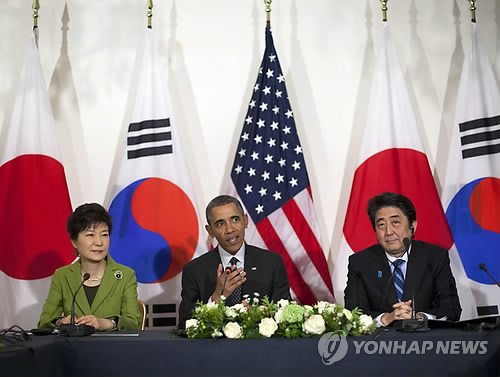- California Assembly OKs highest minimum wage in nation
- S. Korea unveils first graphic cigarette warnings
- US joins with South Korea, Japan in bid to deter North Korea
- LPGA golfer Chun In-gee finally back in action
- S. Korea won’t be top seed in final World Cup qualification round
- US men’s soccer misses 2nd straight Olympics
- US back on track in qualifying with 4-0 win over Guatemala
- High-intensity workout injuries spawn cottage industry
- CDC expands range of Zika mosquitoes into parts of Northeast
- Who knew? ‘The Walking Dead’ is helping families connect
South Korea, US, Japan to share intelligence on North Korea

In this March 25, 2014 file photo, President Barack Obama meets with Japanese Prime Minister Shinzo Abe, right, and South Korean President Park Geun-hye at the U.S. Ambassador’s Residence in the Hague, Netherlands. These three countries will sign an arrangement Monday to share military intelligence on North Korea’s nuclear and missile programs.
By Jun Ji-hye
South Korea, the United States and Japan will sign an arrangement Monday to share military intelligence on North Korea’s nuclear and missile programs, the Ministry of National Defense said Friday.
Despite some built-in limitations, the pact will be the first of its kind for Seoul and its former colonial ruler.
To address Korea’s concern, Washington will mediate between Seoul and Tokyo.
“The arrangement does not mean direct sharing with Japan. We will give our intelligence first to the U.S. and the tips will then be shared with Japan upon our approval, and vice versa,” a ministry official said.
He added that vice ministers from the three countries will sign the pact separately without gathering for a ceremony.
The three have been discussing intelligence sharing since May when they agreed on the need for it in the face of Pyongyang’s evolving security threats during defense ministers’ talks, dubbed the Shangri-La Dialogue, in Singapore.
“All three have been paying attention to the nuclear and missile threats from the repressive state since it conducted a third nuclear test on Feb. 12, 2013,” the official said. “The isolated state ratcheting up its threats is raising concerns not only in South Korea but in Japan, Hawaii, Guam and on the U.S. mainland.”
The agreement comes two years after a bilateral intelligence-sharing pact between Seoul and Tokyo foundered at the last minute due to fierce public criticism of the government’s secretive handling of negotiations.
At the time, the Lee Myung-bak administration had pushed for the agreement to be signed to enable the two sides to share comprehensive intelligence directly.
For the envisioned pact, no additional domestic process for approval is necessary as the subjects of the signing will not be the three nations but their defense ministries, the official explained.
Seoul and Washington have had a bilateral military intelligence sharing agreement since 1987, while the U.S. and Japan signed one in 2007.
The official stressed, “Cooperation between the three nations is expected to boost the quality of intelligence on the North, which will enable the allies to respond to possible provocations in a swifter fashion.”
However, opposition among the public against signing such a pact is also expected. The Korean Peninsula was ruled by Japan from 1910 to 1945, and resentment over its atrocities, such as the sexual enslavement of Korean women for its troops, still runs deep among a number of South Koreans.
The strengthening military cooperation between Seoul, Washington and Tokyo is also expected to cause resistance from China and Russia, with some critics claiming that the trilateral pact is the de facto beginning of cooperation in the U.S.-led missile defense (MD) system.
Regarding the issue, the official said, “The intelligence-sharing pact is unrelated to joining the MD system. South Korea has plans to develop its own Kill Chain preemptive strike and Korean Air and Missile Defense (KAMD) systems. The U.S. has its own as well. The allies’ intelligence-sharing will boost the interoperability of such systems.”












